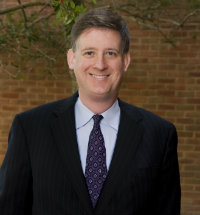Meese Presents Research at Antitrust Conference

Also Is Cited as Among Most Popular Authors in Two Databases
On October 26, Ball Professor of Law Alan Meese participated in a conference at George Washington University Law School in Washington, D.C. The theme of the conference was "The Goals of Antitrust."
Meese presented a paper at the conference titled "Reframing the (False?) Choice Between Purchaser and Total Welfare: Removing the Blinders Imposed by the Partial Equilibrium Tradeoff Model." The paper contends that debates over the normative content of antitrust law reflect an incomplete understanding of the economic impact of practices that both create efficiencies and raise prices in the relevant market. In particular, the paper shows that antitrust's embrace of the partial equilibrium tradeoff model obscures the fact that new efficiencies free up resources for use elsewhere, thereby increasing output and reducing prices in other markets. As a result, such transactions, while harmful to consumers in the relevant market at a particular moment in time, may actually improve the welfare of consumers as a whole, either immediately or over time.
All of the conference papers will be published in a forthcoming issue of the Fordham Law Review. The following antitrust scholars either presented papers at the conference or will be publishing papers in the conference symposium issue: Jonathan Baker (American University), Roger Blair (University of Florida), Dale Collins (Shearman & Sterling), Einer Elhauge (Harvard), Harry First (New York University), Eleanor Fox (New York University), Judge Douglas Ginsburg (New York University), Herbert Hovenkamp (Iowa), John Kirkwood (Seattle University), William Kovacic (George Washington), Robert Lande (University of Baltimore), Barak Orbach (University of Arizona), George Priest (Yale), Steven Salop (Georgetown), Maurice Stucke (University of Tennessee), and Joshua Wright (George Mason University).
Meese, who served as a senior advisor to the Antitrust Modernization Commission from 2004-07, is a nationally acclaimed antitrust scholar. As outlined in a recent profile, his scholarship focuses on the intersection of antitrust law and policy and transaction cost economics. His work is widely cited, including by Nobel Laureate Oliver Williamson and Supreme Court Justice Samuel Alito, who cited Meese's work on the Rule of Reason in a recent article on the origin of Antitrust's baseball exemption.
BePress lists Meese as the most popular Antitrust and Trade Regulation author in its database of more than 900 authors. He also is listed in the top ten for Corporations and Enterprise Law in a database of more than 1,300 authors. Click here to visit the Antitrust and Trade Regulation Commons. Click here to visit the Corporations and Enterprise Law Commons. View "Popular Authors" on right-side columns of both pages.
Meese maintains a blog, devoted mainly to issues of political economy, a subject first taught in North America by Bishop James Madison, then president of the College of William and Mary.
Meese's recent scholarship includes:
• Assorted Anti-Leegin Canards: Why Resistance Is Misguided and Futile, 40 FLORIDA STATE L. REV. _____ (forthcoming 2013).
• Reframing the (False?) Choice Between Purchaser and Total Welfare: Removing the Blinders Imposed by the Partial Equilibrium Tradeoff Model, 81 FORDHAM L. REV. _____ (2013).
• Market Power and Contract Formation: How Outmoded Economic Theory Still Distorts Antitrust Doctrine, 88 NOTRE DAME L. REV. ___ (forthcoming 2012-13).
• Section 2 Enforcement and the Great Recession: Why Less (Enforcement) Might Mean More (GDP), 80 FORDHAM L. REV. 1633 (2012). SSRN.
• Standard Oil as Lochner's Trojan Horse, 85 S. CAL. L. REV. 783 (2012).
• Debunking the Purchaser Welfare Account of Section 2 of the Sherman Act: How Harvard Brought Us a Total Welfare Standard and Why We Should Keep It, 85 N.Y.U. L. REV. 659 (2010). SSRN.
• Reframing Antitrust in Light of Scientific Revolution: Accounting for Transaction Costs in Rule of Reason Analysis, 62 HASTINGS L. J. 457 (2010). SSRN.
For links to many of Meese's publications, visit this SSRN page.